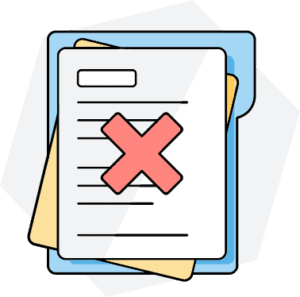Qualifying life events are situations that trigger a special enrollment period (SEP) to enroll in a health insurance plan outside of the annual enrollment period. Examples of qualifying life events include a marriage or divorce, the birth or adoption of a child, or the death of a spouse or parent if you are still on their insurance plan.
Insurers require your qualified life event documentation to grant a SEP before the next open enrollment cycle.
Table of Contents
- The Importance of Understanding Qualifying Life Events
- How Do Qualifying Life Events Work?
- Types of Qualifying Life Events
- How to Navigate Qualifying Life Events and Health Insurance
- What If You Need to Change Coverage But Do Not Have a Qualifying Life Event?
- Putting It All Together
- Frequently Asked Questions
The Importance of Understanding Qualifying Life Events
If you experience a qualifying life event outside of the normal enrollment period for health insurance, your insurer may allow you to change your health plan to stay protected. Qualified life events that affect your household, employment, location, age, or current health insurance must be reported immediately to your insurer to avoid loss of coverage.
These qualifying events can occur after a significant transition in your life. Besides the other factors that may make this time difficult or overwhelming, your health needs may also change. Understanding qualifying life events can better prepare you for that situation if it arises.
How Do Qualifying Life Events Work?
A qualifying life event triggers a special enrollment period for health insurance outside of open enrollment. Beneficiaries who do not qualify for a SEP must wait until the next annual enrollment period to change their coverage or purchase a new plan.
Most states allow 60 days to enroll without charging a late penalty starting on your qualifying life event date. Insurers may require one or more types of formal documentation of your qualified live event. Examples of accepted documentation include:
- Utility bills
- Rental or mortgage documents
- Homeowners insurance
- Birth certificate
- Death certificate
- Marriage license
- Letter from employer
- COBRA termination notice
Changes in coverage take effect retroactively on the date of the birth or adoption of a child or acquiring a medical support order, or the first month following the event for other qualifying life events.
Do Qualifying Life Events Expire?
Depending on your situation, you may have 60 days before and up to 60 days after the event to enroll in a new health plan. Individuals with existing healthcare coverage who delayed Medicare enrollment may sign up for Medicare Part B for up to 8 months after their policy ends.
You must submit your qualifying life event documentation within 30-60 days. If you wait too long to take action, you may no longer be eligible for the special enrollment period.
Types of Qualifying Life Events
The following categories cover qualifying events for health insurance special enrollment periods, including changes in your family, current coverage, or residency.
Changes in Your Household
Changes in your household that may affect your health insurance include the following:

- Marriage or domestic partnership: One spouse or partner must be covered for at least 60 days before the wedding or meet domestic partnership requirements in their state to qualify.
- Divorce or ending a domestic partnership: Individuals must remove their ex-spouse or ex-partner from their plan as soon as the divorce is finalized or a legal separation occurs.
- Birth, adoption, or foster care: You may enroll in a new health plan at the time of your child’s birth or adoption, or add your child to your existing plan during your SEP.
- Court order for child support: Health insurance includes a child support component, issued as a Medical Child Support Order by the court. If both parents have employer-sponsored health insurance, the court could order one of the parents to add the child to their plan.
- Death of someone on your health plan: If you are on the deceased’s health plan, you will lose your health coverage. If someone listed as a dependent on your health coverage dies, you must notify your insurer since it could affect your premiums.
- Domestic abuse survivors: Domestic abuse survivors are not required to provide any documentation. They may simply apply for a SEP and enroll in a plan within 60 days of the request.
- Spousal abandonment: Your spouse must have stopped supporting your family financially and been gone for at least 6 months to qualify for a special enrollment period.
Changes in Your Employment and Finances
Employment changes can greatly impact your income and your health insurance, especially if you receive group benefits.
- Job changes affecting your income: A change in your income may affect your insurance, particularly your premiums. If you are on Medicaid and your income now exceeds the Medicaid limit, you may qualify for a SEP.
- Loss of employer-sponsored health insurance: If you lose your job and your employer-sponsored health insurance, you could be eligible for a SEP. You may not be eligible if you voluntarily resign from your job.
Changes in Your Age

Aging out of your parent’s health insurance coverage or becoming Medicare-eligible are common qualifying life events for special enrollment.
- Turning 26 and losing parental coverage: Your health coverage may end on the last day of the month when you turn 26 if you are listed as a dependent child under your parent’s health insurance.
- Turning 65 and becoming Medicare eligible: Original Medicare offers federally funded health insurance. Your initial enrollment period begins three months before your 65th birthday and ends three months after your birthday.
Changes in Your Location
Your health insurance options change depending on where you live, so the following will trigger a SEP:
- Moving to a new area: Moving to a different state will count as a qualifying life event if the other state does not carry your current health plan. You may be eligible for a SEP if you move within the same state and the insurance options vary.
- Change in citizenship or legal residency: After you become a U.S. citizen or gain the status of lawful residency, you have 60 days to enroll in health insurance.
- Release from incarceration: After your release from imprisonment, you have 60 days to enroll in health insurance. If your income is up to 138% of the federal poverty level, you may apply for Medicaid.
Changes in Your Current Health Insurance

You may need to find a new policy if you involuntarily lose your group benefits and either cannot afford COBRA or are approaching the close of your COBRA coverage period.
- Losing minimal essential coverage: You can qualify for a SEP if you involuntarily lose your essential healthcare benefits. This may include the loss or expiration of group coverage for employees or students.
- Losing COBRA coverage: COBRA allows you to keep your employer-based health coverage for 18 months if you lose your job. After those 18 months, you may have a special 60-day enrollment period to enroll in your own health insurance.
- Grandfathered plan changes: Grandfathered plans, or health insurance policies purchased on or before March 23, 2010, may not be changed in any way, meaning the benefits and cost of the insurance must remain the same. You cannot lose a grandfathered plan; however, your insurer may make changes to the coverage at their discretion, which can trigger a SEP.
- Grandmothered plan changes: These plans are non-grandfathered plans purchased from 2010 to the end of 2013 that are not fully ACA-compliant. You cannot lose a grandmothered plan; however, your insurer may make changes to the coverage at their discretion, which can trigger a SEP.
Other Eligible Changes
Other life changes outside of the usual categories can trigger a special enrollment period, including the following:
- Tribal membership: If you’re an American Indian or Alaska Native, you may qualify for a special enrollment period if you are enrolled in group health insurance, your current group health insurance ends, or you serve as a volunteer overseas.
- Medicaid and/or CHIP: Medicaid and the Children’s Health Insurance Program (CHIP) are state-funded healthcare programs for low-income adults and children, respectively. You may enroll in either of these programs at any time. Losing eligibility for Medicaid or CHIP may count as a qualifying life event for a special enrollment period.
How to Navigate Qualifying Life Events and Health Insurance
Staying organized and following these steps is key to earning a special enrollment period for your qualifying life event.
- Understand the timing. Remember the 60-day deadline to report your qualifying event and aim to apply well before this window closes. Consider even earlier reporting of any event that can be scheduled ahead of time, such as a move.
- Gather necessary documents. The type of documentation you need depends on your specific situation. Consider the time it takes for things like shipping and delivery, and plan ahead if requesting your documents requires multiple steps over time.
- Explore coverage options. Begin researching other plans or insurers so you know what changes you will make during the special enrollment period.
- Consider financial implications. Making changes to your plan may affect the cost of your coverage, including your monthly premium. Carefully budget for this expense, especially if you lost your job and group benefits.
- Consult with experts. Ask your insurance agent, Medicare or Medicaid representative, ACA consultant, or financial advisor for help documenting a qualifying life event.
What If You Need to Change Coverage But Do Not Have a Qualifying Life Event?

If you do not experience a qualified life event to warrant a special enrollment period, you can still take advantage of other options to avoid a loss of coverage.
You may choose to sign up for short-term coverage or wait until the next annual open enrollment period. Short-term health insurance can also provide emergency benefits for scenarios such as changing jobs or attending college out of state, so your coverage will not lapse.
If you enroll in a Medicare supplement (Medigap) plan, you may change your plan at any time of the year, provided you meet that policy’s health and renewal requirements. Medicare Advantage beneficiaries also enjoy their own annual enrollment window. Talk to your insurer for options outside of special enrollment periods.
Putting It All Together
Experiencing a qualifying life event means you can switch plans or enroll in a new policy outside your insurer’s regular annual open enrollment window. Insurers require specific forms of documentation based on different qualified life events. While some states may impose a shorter window, most insurers require proof of the event within 60 days. You may become ineligible for the special enrollment period if you fail to submit the necessary documentation by the deadline.
